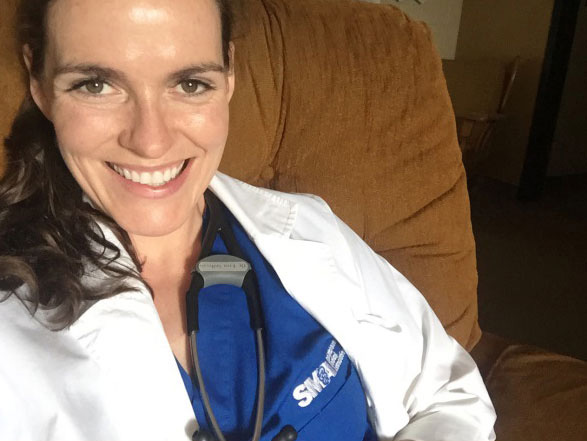
Community practice
Dr. Sullivan may have been educated overseas, but returning to practice in Canada was always her end goal
By SaskDocsIt’s mid-morning and Dr. Erin Sullivan is sipping on a warm drink at Dr. Java’s on 15th Street East in Prince Albert, Saskatchewan.
It is one of Sulivan’s favourite places to unwind after pulling a long shift at the Victoria Union Hospital in Prince Albert. Dr. Sullivan savours these moments because they don’t seem to come often enough as she is one of the many family doctors meeting the health care needs of the Prince Albert Parkland Health Region’s growing population.
“Last night was really busy. I came off a shift where we had a number of expecting moms coming in to deliver their babies. Almost all of them had different health care needs. It was really busy, but that is something you can expect when you practice medicine here in Prince Albert. In one year alone I think the health region had 1,600 deliveries, but I wouldn’t want it any other way.”
Sullivan, a University of Saskatchewan (U of S) Enhanced Surgical Skills (ESS) Resident, lives in Prince Albert and loves the diversity of the medical practice in that city and the experience she gains in that setting. Originally from Entwistle, Alberta, she followed her grandfather’s footsteps and decided to go into medicine, and although nursing was her first career choice, becoming a doctor was always her long term plan. That was when Sullivan decided to complete her medical degree overseas and return home to Canada to start her professional career.
“My grandfather was originally a family physician in Devon, Alberta and then went on to become a cardiologist and professor emeritus at the University of Alberta (Edmonton). Medicine was obviously a big part of his life and our family life and so I became a nurse and worked as a nurse for a while and then, sticking with my long term plan, I eventually decided to take the plunge and go into medicine.”
A lot of what appeals to Sullivan about Prince Albert are the number of professional opportunities that she feels may not be available anywhere else. Even though communities like Prince Albert are smaller than Saskatoon or Regina, the health care needs and challenges of the general population are both similar and diverse. Sullivan thinks one of the main differences is that you have more face time with the specialists already practising there, which presents a great learning opportunity.
“Having to travel long distances to other centres to get certain procedures done makes it very difficult for the patient. Therefore, if places like Prince Albert can offer some of those procedures it not only benefits residents like me who want to enhance their skills a little bit, but it also makes it easier for those patients to not travel quite as far to get something done.”
Practicing medicine in Prince Albert and being close to professional colleagues is really appealing to Sullivan, but she freely admits getting used to moving back to Canada, let alone Prince Albert, was a bit of an adjustment for her after several years of studying medicine overseas.
“I enjoy my network of friends I’ve made, and the professional networks. I love the hospital and the people I work with. The only struggle for me was getting used to being in a prairie winter. I took my training overseas for 10 years and I had to get used to this all over again. In fact, on one really cold day I couldn’t find the cord to plug in my car so I was standing outside looking for it and I started feeling really weird and realized that this weird feeling was frostbite. It really struck me then that I had to become acclimatized to the cold weather all over again.”
Adding to the benefits of practicing medicine in Prince Albert is the Enhanced Surgical Skills (ESS) program which allows people like Sullivan to not only practice medicine, but learn more about atypical medical procedures.
“The ESS program in P.A. is, to my knowledge, the only program in Canada where residents can have their training pertinent to the community you’re planning to practice in and the skill set you need to have it done. The program works very hard to ensure the residents have the competencies to do things like C-sections, tubal ligations, higher risk deliveries, appendectomies, open hernias and so forth. I’ve had a lot of my colleagues across the country say ‘I am so jealous that you get training in that stuff and I’d love to do some of that, but just don’t have the opportunity here.’ So we are really lucky to have something like the ESS program.”
Like many other U of S medical residents now calling Saskatchewan home, she's is excited about what the future holds and loves the fact that many of her program colleagues are close by, and this really supports a peer network approach to delivering care.
“I have six family medicine residents in my year all practicing medicine here or close by: three in PA, one in Shellbrook doing locum, another in Melfort just opening her practice and another in Saskatoon. It’s nice to have the network of colleagues close by. It is great to be here.”
